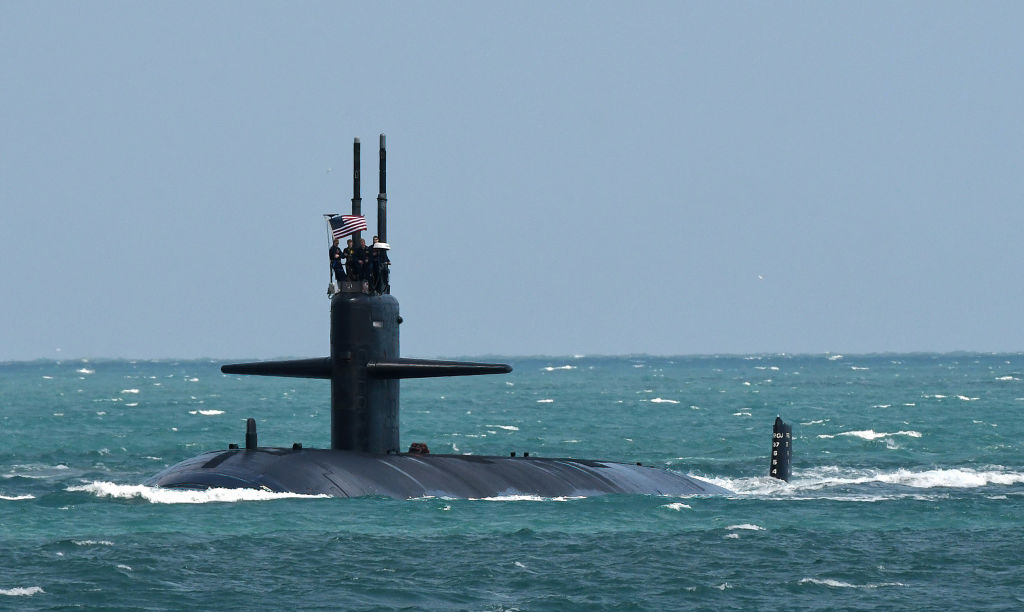Why the seabed is primed to be the next battlefield
Militaries are pouring billions into bulking up their underwater defenses


A free daily email with the biggest news stories of the day – and the best features from TheWeek.com
You are now subscribed
Your newsletter sign-up was successful
While the headlines have recently been looking to the stars for the next iteration of military prowess, the United States is focusing on a different playing field to hone the next generation of war that may be just as foreign as outer space: the seabed.
Less than 10% of the ocean floor has been mapped globally, according to the U.S. Geological Survey, but this has not stopped the military from developing an array of technologies for use on the seabed. This is no small investment either; reports suggest the U.S. is looking to spend billions on seabed warfare. However, the Pentagon is not the only place where this type of dominance is being worked on, as both China and Russia are reportedly deep in the development of seabed technologies. A 2020 report in The National Interest suggested the U.S. was ahead of China in seabed development, though the Chinese Navy "is now giving the undersea realm the priority it deserves for ambitious naval powers in the 21st century," and Russia is reportedly working on similar technology. But how exactly does war play out on the seabed, and how will it factor into future conflicts?
What's seabed warfare and how's the U.S. implementing it?
The term seabed warfare does not yet have "a universally accepted definition," according to the U.S. Naval Surface Warfare Center (NSWC). Still, the center describes it as "operations to, from and across the seabed." This type of warfare often involves targeting infrastructure, such as fiber-optic or power cables and deep-sea gas pipelines, the Center for International Maritime Security (CIMSEC) reported.
The Week
Escape your echo chamber. Get the facts behind the news, plus analysis from multiple perspectives.

Sign up for The Week's Free Newsletters
From our morning news briefing to a weekly Good News Newsletter, get the best of The Week delivered directly to your inbox.
From our morning news briefing to a weekly Good News Newsletter, get the best of The Week delivered directly to your inbox.
As technological infrastructure becomes more advanced, the United States is looking to develop the next generation of military vehicles to become dominant on the seabed. The U.S. Navy is working on producing a $5.1 billion state-of-the-art spy submarine that would prowl the ocean floors, USA Today reported. The unnamed vessel, which would be a successor to the nuclear spy submarine USS Jimmy Carter, would "patrol the deepest reaches of the ocean and deploy minisubs and drones that can battle hostile forces while withstanding the crushing pressure of the ocean depths," according to the outlet.
This new submarine is just one of several seabed technologies being developed, though USA Today stated the others remain secret. Naval News reported that the submarine is already being constructed at a naval shipyard in Groton, Connecticut, though no completion date has been revealed.
Why is seabed warfare becoming an increasing threat?
The most pressing concern is the possibility that hostile nations or terrorist groups could attack the aforementioned infrastructure, USA Today reported, especially given that "oil and gas pipelines crisscross the ocean floor, and telecommunications cables that connect one continent to another are even more ubiquitous."
An attack on just a single cable "could knock out critically needed internet access, energy supplies and other necessities for tens of millions of people," USA Today added. Admiral James Stavridis, a former NATO Supreme Allied Commander in Europe, wrote in a 2017 report that 95% of internet traffic is carried by just 200 undersea fiber-optic cables, and an attack on any of them could be "potentially catastrophic" to the U.S.
A free daily email with the biggest news stories of the day – and the best features from TheWeek.com
Foreign powers such as Russia are also reportedly using "underwater surveillance equipment and are mapping key sites for possible sabotage," according to BBC News, using deep-sea exploration vessels disguised as fishing trawlers. Then there's the threat of China, which the U.S. appears to see as the most pressing. Indian outlet Firstpost reported that the new American submarine could be used to "target China's military installations in remote South China Sea islands, infiltrate enemy naval bases and target hostile warships at port."
One issue, though, is that limited knowledge of the deep oceans makes undersea operations very difficult. "The Navy's capability to affect in, from and into the deep ocean is at best extremely limited but for the most part nonexistent," CIMSEC reported. "Capabilities specifically relative to the seabed are even less and with the Navy's mine countermeasures capabilities also being very limited." So while the U.S. is reportedly working briskly to stop seabed threats, the technology's ubiquity may still be a ways away.
Justin Klawans has worked as a staff writer at The Week since 2022. He began his career covering local news before joining Newsweek as a breaking news reporter, where he wrote about politics, national and global affairs, business, crime, sports, film, television and other news. Justin has also freelanced for outlets including Collider and United Press International.
